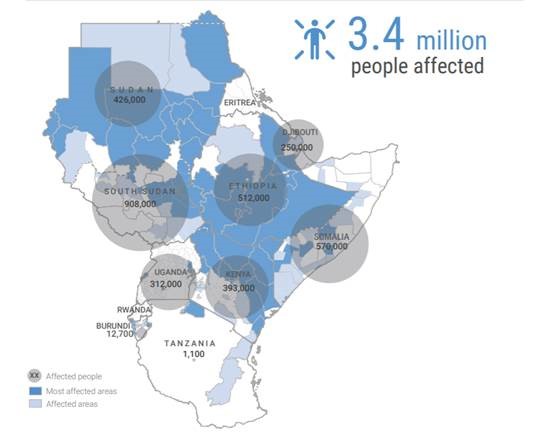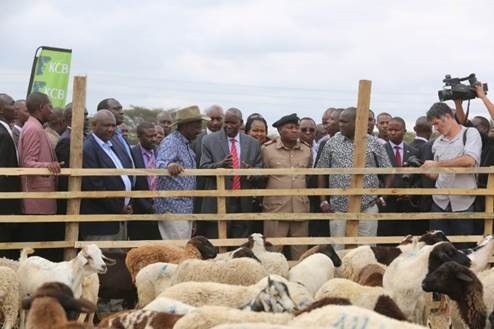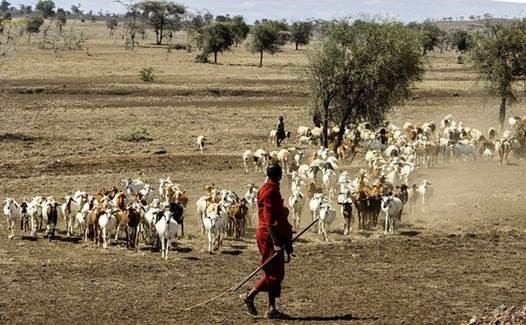The implications of COVID-19 on pastoralist livelihoods in Kenya’s drylands.
Posted on 3 April 2020 by Billy Jones
The views expressed in this publication are those of the authors and do not necessarily represent those of the Agenda 2030 Graduate School or Lund University. The present document is being issued without formal editing.
Let me ask you a question. And I want you to be honest. How much has the coronavirus pandemic really affected your life so far? Has it forced you to work from home? Cancel a few meetings? Maybe delay your fieldwork? If, like me, the answer to all these questions is yes then you are probably extremely privileged.
If you are lucky enough to still have a job and have not lost any loved ones then, in all honesty, the impact of coronavirus on your day-to-day life is probably not that bad. Worrying, sure. Inconvenient, definitely. But far from devastating.
Now, I’m not just saying this to make you feel bad. I’m merely hoping to offer a dose of perspective, to make you realise how lucky you are. Because for some people – in fact, the vast majority of the global poor – coronavirus genuinely is ruining lives.
Let’s take a look at an example.
The rugged drylands of Kenya are home to some 10 million pastoralists whose livelihoods depend on raising livestock and selling the produce at market. In a country of extreme income inequality, 35% of the population live on less than $1.90 a day and livestock produce is fundamental to income and food security.
Already on the Back Foot
Unsurprisingly, climate change is a real threat in the region, making life more precarious and income security harder to come by. Last year was no exception.
In a region that relies on two rainy seasons a year to produce enough vegetation to feed the 65 million cows, sheep and goats that keep pastoral economies afloat, it is paramount that the rains don’t fail.
Which they did last year. Both of them.
These back-to-back droughts were followed by extreme flooding which severely affected 3.4 million livelihoods in the region, washing away entire villages and drowning the grasslands that feed the livestock.

And, as if that wasn’t enough, the floods were followed by a plague of locusts which has ravaged the entire region. The swarm which is making its way across East Africa eating as much food as 35,000 people every single day risks pushing 3 million people into food insecurity.
To put it mildly, climate change has made life tough for Kenya’s pastoralists over the past year.
And now they have coronavirus to deal with.
Interventions and Livelihoods
Like most others, the Kenyan government have been urging people to practice social distancing, self-isolate and work from home when possible.
But, what exactly does this mean for pastoralists? They typically sell their livestock at bustling, crowded markets and abattoirs, or sell milk to local restaurants and schools. Working from home is certainly not an option. Social distancing at a busy market is nigh-on impossible. And self-isolating means you cannot go to market and sell your livestock for much needed cash.

On top of this the government are taking serious actions to prevent the spread of the disease such as nationwide curfews, banning public gatherings and closing schools, universities and bars and restaurants. While the benefits of this approach ought to be recognised, it will also have a serious economic impact on pastoralists. For example, with 86% of Kenya’s dairy being sold informally at local schools, kiosks and restaurants, these actions threaten to cut off an extremely important source of daily income for many pastoralists. In typically patriarchal societies, this has a bigger impact on women. Milking is typically a female domain and this daily income is often the only income they have control over, meaning even more income insecurity for women.
Moral Dilemma
This puts pastoralists in an extremely difficult situation. Do they follow the rules, thereby foregoing the desperately needed income they have lost in the past year of climatic disasters? Or do they carry on as normal and risk spreading the virus among their community and throughout the national market networks?
The economic shockwaves of coronavirus are undoubtedly going to devastate the livelihoods of countless pastoralists who are already faced with unfathomable climate challenges to say the least. And sadly, this sobering set of circumstances is far too similar for poor communities the world over.
Time will only tell the impact this pandemic has on the livelihoods of those most at risk. Hopefully the world’s leaders will step up and offer those who most need it the support to ride the shockwaves.
In the meantime, I hope this gives you a bit of perspective on your own situation. Perhaps working from home isn’t so bad after all.

